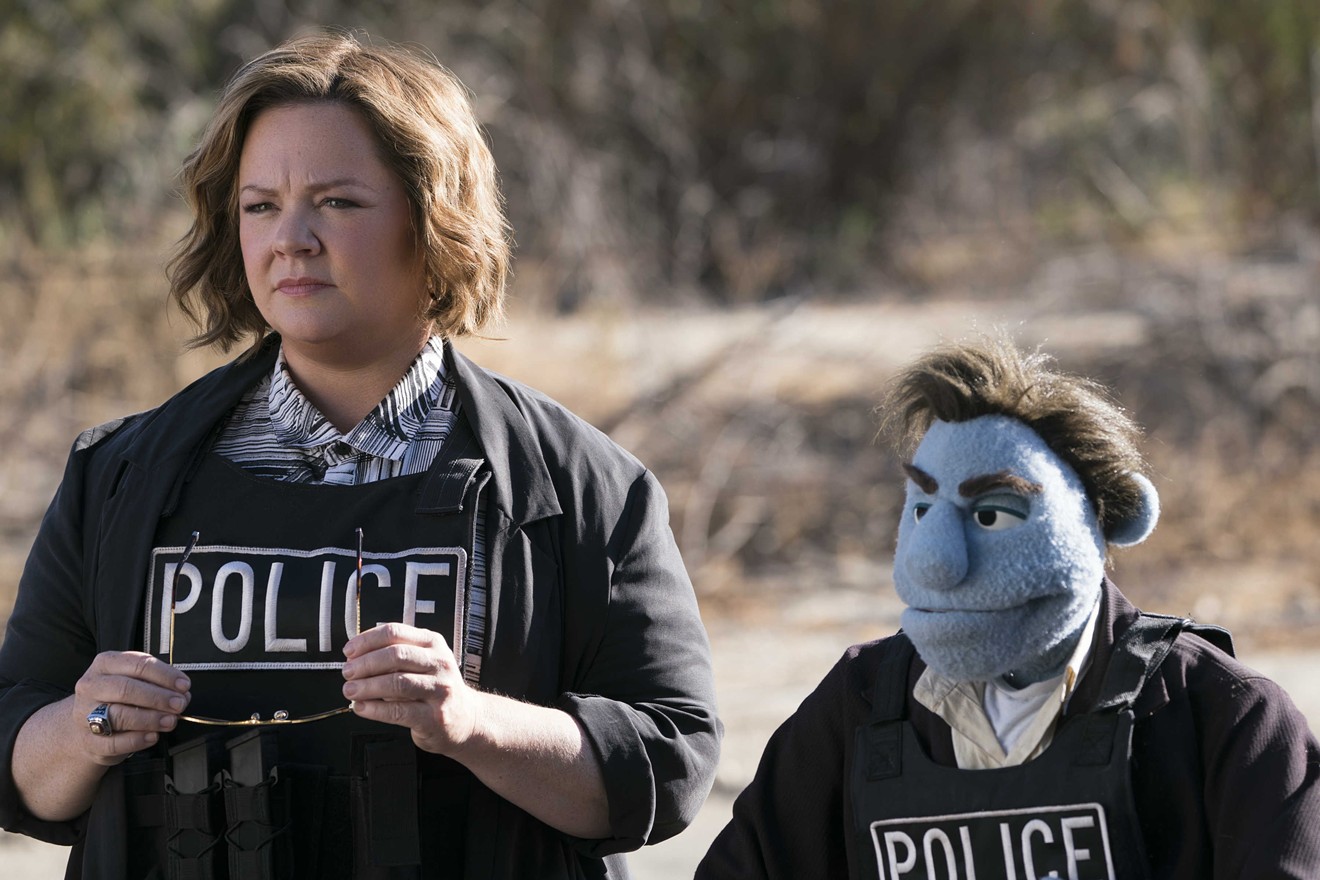There are circumstances under which I could recommend The Happytime Murders, Brian Henson’s long-at-90-minutes detective comedy in which Melissa McCarthy, that trouper, strains to put fresh oomph into each of the dozens of “fuck you”s she snarls at curiously unmemorable puppets. But those circumstances would all involve at least a couple of decades having passed, when the now we live in has faded to a haze. The time to watch this would have to be when the dated subjects parodied in Todd Berger’s script (Basic Instinct! ’90s sitcoms!) have matured into emblems of a bygone age. When you might not bristle that the recurring “asshole says what?”/“What?” routine was cribbed from Wayne’s World. When the half-assed, sub-Bright premise of felt-and-stuffing puppets as America’s most oppressed minority, serving as maids and denied representation in media, might play as a revealing illustration of the clueless insensitivity of our age’s producers right before things got better rather than become another pothole at that age’s nadir.
“Were they actually trying to say that being white in America is like being a human surrounded by puppets?” you might ask, as McCarthy’s character, detective Connie Edwards, crabs that her puppet-detective partner, the drab Phil Philips (performed by Bill Barretta), shouldn’t take offense at her cracking jokes about the blueness of his felt. He bristles, and she pulls a mock-shock face, the oh, that’s racist now? sneer of a bigmouth about to rail against political correctness. The scene seems intended to suggest, of course, the discomfort of a real-life white person who (perhaps accidentally) says the wrong thing to a non-white person. It plays out, though, as if the differences that make some white people nervous are simultaneously small, goofy annoyances that everyone else needs to lighten up about and also differences so vast that they go beyond the level of species. If the analog, here, is meant to be that McCarthy is the American norm, a white cop, and puppet Phil, a generic minority, the minority isn’t even categorically human. In 2018, Hollywood still needs to be reminded with some regularity that non-white people are.
So, a couple of decades from now, it might be interesting to watch this often glum detective procedural in which the populations who have endured American racism have been Find-Replaced with horny puppets. You might note that it came out the same year as BlacKkKlansman, Crazy Rich Asians, Sorry to Bother You and Blindspotting. You’ll almost certainly get more out of McCarthy’s energetic but familiar performance, then, if you see it without so many other McCarthy performances in your recent memory. She reveals no new angles to her brawling comedy, here, not even when her character gets ripshit high snorting a puppet drug lord’s cocaine-grade sugar crystals, but she also never turns mawkish, as she did in Tammy.
A couple of jokes work now, and made me laugh out loud, especially one involving an erotic entanglement between a puppet cow and a puppet octopus, and several delivered by Maya Rudolph, who plays the detective’s old-school noir moll secretary, Bubbles. One set piece involving vigorous puppet sex and Silly String ejaculate, meant to be a showstopper, only set me laughing with a cut to Bubbles, gently annoyed in the next room, pulling a bottle of Windex out from beneath the desk. She’s had to deal with this all before.
The director, Brian Henson, is the son of Jim Henson and the chairman of the Henson company. He’s an accomplished puppeteer and director; he helmed 1992’s excellent The Muppet Christmas Carol. He also created Puppet Up!, an adults-only improv puppet theater and TV show, in which puppeteers, using quite Muppet-y creations from the workshop, act out R-rated short-form comedy scenes. Short-form improv demands inspiration rather than logic or storytelling, and much of the humor in Happytime Murders reflects that impulse. Take the bit where Elizabeth Banks, playing an actress turned stripper at a puppet club, performs (in jean shorts!) on a stage for the pleasure of horny bunnies. “This is arousing my Peter Rabbit!” a bunny exclaims. Then Banks whips out a carrot, which sets the bunnies howling, especially when she begins peeling it, right onstage, making it rain on her patrons with thin orange slivers. This turns on one bunny so much he shouts, “We’re not in the briar patch anymore!”
Those are three jokes, only one of which is funny (Banks peels her carrot with great lusty cheer) and none of which make sense. Isn’t the whole thing about rabbits that they fuck like rabbits, in the briar patch? In a Puppet Up! show, the cast would move on from that to something new and unrelated. Happytime Murders, though, demands that we take its world somewhat seriously, that we invest ourselves in the tensions between people and puppets, that we buy into its by-the-book serial-killer narrative, which comes complete with planted clues and a tragic backstory. But the details of it seem thoughtlessly improvised.
Coming after Crank Yankers, Team America: World Police, Meet the Feebles and Wonder Showzen, none of the giddy raunch in Happytime Murders is new. What is: the name “Henson” on a movie inviting us to giggle at puppet pubes. (Both this and Puppet Up! carry the production shingle “Henson Alternative.”) Some viewers, perhaps, might be shocked at the association of Mr. Rainbow Connection with scenes set in porno shops, strip clubs and drug dens. What jolted me, though, was seeing the Henson name all over a project that’s so often bland and listless, so tame in its designs, so limited in its imagination, so joyless in its execution. With Who Framed Roger Rabbit, Robert Zemeckis aspired to a cartoon Chinatown. For his own genre-bent L.A. noir, Henson seems only to be aiming as high as the few jokeless scenes in The Naked Gun movies. The characters may be made of fabric, but nothing here is deeply felt.
[
{
"name": "Air - MediumRectangle - Inline Content - Mobile Display Size",
"component": "18478561",
"insertPoint": "2",
"requiredCountToDisplay": "2"
},{
"name": "Editor Picks",
"component": "16759093",
"insertPoint": "4",
"requiredCountToDisplay": "1"
},{
"name": "Inline Links",
"component": "17980324",
"insertPoint": "8th",
"startingPoint": 8,
"requiredCountToDisplay": "7",
"maxInsertions": 25
},{
"name": "Air - MediumRectangle - Combo - Inline Content",
"component": "16759092",
"insertPoint": "8th",
"startingPoint": 8,
"requiredCountToDisplay": "7",
"maxInsertions": 25
},{
"name": "Inline Links",
"component": "17980324",
"insertPoint": "8th",
"startingPoint": 12,
"requiredCountToDisplay": "11",
"maxInsertions": 24
},{
"name": "Air - Leaderboard Tower - Combo - Inline Content",
"component": "16759094",
"insertPoint": "8th",
"startingPoint": 12,
"requiredCountToDisplay": "11",
"maxInsertions": 24
}
]












